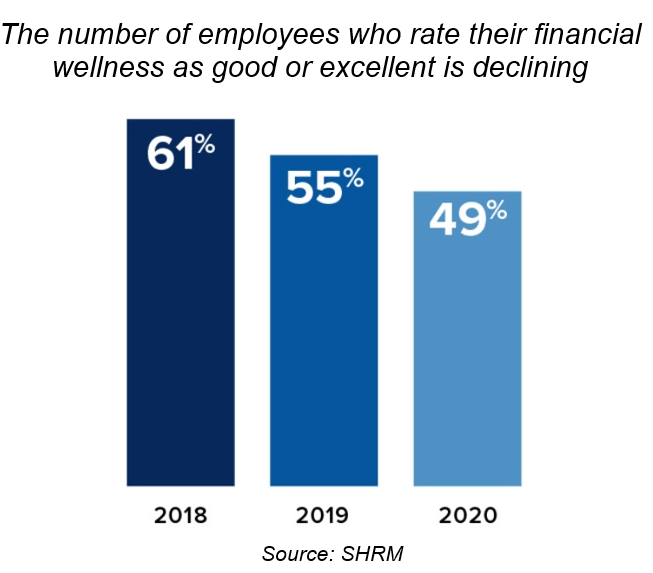What Is Financial Wellness?
Financial wellness is an overall sense of stability and control over an individual’s personal financial situation. Financial wellness helps people feel safe and secure about their long-term financial outlook. Specifically, a state of financial wellness is characterized by:
• Living within a budget
• Being prepared for financial emergencies
• Having access to tools and resources to help make informed financial decisions
• Having a plan for the future
Are Financial Wellness Programs Necessary?
Unfortunately, according to Smartdollar.com, 60 percent of Americans feel some level of stress about money. The data gets worse from here. According to a report from the Federal Reserve in 2019, 39 percent of Americans do not have enough savings to cover a $400 emergency1.
There is also a significant gender gap in financial wellness. According to a 2019 Forbes article, while men reported a median retirement savings of $100,000, women only reported $30,000 in median retirement savings. According to the same article, only 43 percent of women reported feeling financially well, and yet men reported a 65 percent satisfaction rate with their own financial wellness overall2.

What Are the Key Components of Financial Wellness?
Although most individuals recognize a need for help in their financial situation, very few know where or how to get the assistance necessary to get back on track financially. Below are some critical elements of financial wellness:
✓ Insurance needs
✓ Debt management
✓ Budgeting
✓ Developing an emergency fund
✓ Managing investments

How Has the COVID-19 Pandemic Affected Financial Wellness?
First, the COVID-19 pandemic had a substantial adverse effect on overall financial well-being for the U.S. Employers across the country furloughed, laid off or terminated their employees, which put significant strain on household finances. In a report by SHRM from October 2020, the number of employees who would rate their financial wellness as good declined significantly during the pandemic3.
The second major impact of COVID-19 on financial wellness is the way employees access information and assistance for working toward a sense of financial stability. Financial professionals moved to all virtual meetings for education, thus technology became a bigger factor in delivering the help employees need. Group meetings are now being conducted over video conferences and pre-recorded webinars are being distributed to employees via email.
Why Should Employers Care?
An employee who is stressed about money is not able to give their full attention to their job, and this can hurt the caliber and quality of their work. An article from CorporateWellnessMagazine.com reported that 22 percent of employees said they missed at least one day of work to handle financial problems. 15 percent of employees report spending at least 20 hours a month on financial tasks at work, and 20 percent had to resign due to financial stress4.
Employees who already achieved financial wellness or who are on the road to financial wellness display the following traits:
• Decreased turnover
• Increased productivity
• Reduced healthcare costs
• Higher participation rates in retirement plans
According to the Journal of Occupational and Environmental Medicine, an employee missing one day of work can cost a business an average of $348 in lost productivity per day. This makes a compelling case for employers to offer financial wellness programs to alleviate financial stress4.
The good news is that employers are becoming more and more concerned about their employees’ financial wellness. An October 2020 article from SHRM reports that, in 2020, 62 percent of employers said they felt responsibility for their employees’ financial wellness, up from 13 percent in 20133.
How Can Employers Help with Financial Wellness?
There are already a plethora of tools and resources available to employers who want to help their employees work toward financial wellness. Employers who seek to encourage their employees in a quest for financial wellness will find the following resources indispensable:
✓ Financial professionals, such as Registered Investment Advisors or Certified Financial Planners (CFP®)
✓ Retirement plan recordkeepers
✓ Third-party financial wellness and financial education providers
With assistance from these resources, employers can build a robust financial wellness program that helps their employees.
What Next Steps Should Employers Take Now?
At Fiducient Advisors, we have built a comprehensive financial wellness offering. Through our services, we can help guide employees in finding a sense of stability and control over their finances; easing stress; and helping improve productivity at work. Our collaboration with retirement plan recordkeepers helps us identify participant behaviors and specific ways to engage individuals in the financial wellness process. We work together with our clients to develop a financial wellness program that addresses the needs of the participants.
If you would like to hear more about how our solution can help your organization, please reach out to any of the professionals at Fiducient Advisors.
1The True Definition of Financial Wellness: https://www.smartdollar.com/definition-of-financial-wellness
2Why You Need Financial Wellness, October 11, 2019, John F. Wasik:
https://www.forbes.com/sites/johnwasik/2019/10/11/why-you-need-financial-wellness/?sh=11b7ac1755d6
3Employers Feel More Responsible for Employees’ Financial Wellness, October, 1, 2020, Stephen Miller:
https://www.shrm.org/resourcesandtools/hr-topics/benefits/pages/employers-feel-more-responsible-for-employees-financial-wellness.aspx
4What is Financial Wellness, James Carlson: https://www.corporatewellnessmagazine.com/article/what-is-financial-wellness
The information contained herein is confidential and the dissemination or distribution to any other person without the prior approval of Fiducient Advisors is strictly prohibited. Information has been obtained from sources believed to be reliable, though not independently verified. Any forecasts are hypothetical and represent future expectations and not actual return volatilities and correlations will differ from forecasts. This report does not represent a specific investment recommendation. The opinions and analysis expressed herein are based on Fiducient Advisor research and professional experience and are expressed as of the date of this report. Please consult with your advisor, attorney and accountant, as appropriate, regarding specific advice. Past performance does not indicate future performance and there is risk of loss.


